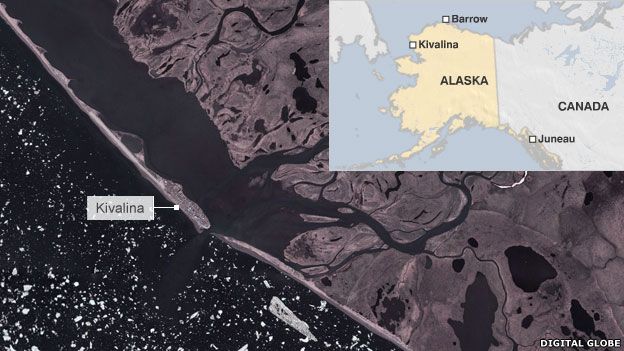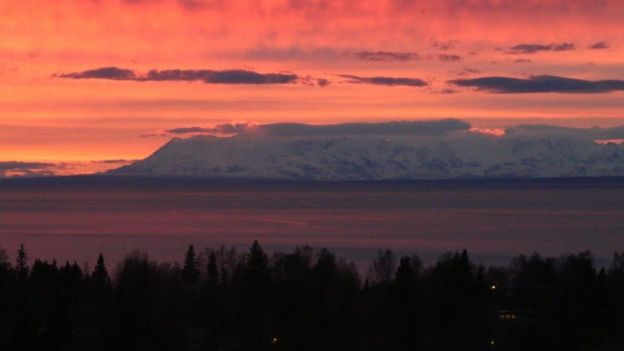Alaska mulls extra oil drilling to cope with climate change
Governor Bill Walker says Alaska needs to drill in order to meet rising climate change costs
Expanding the search for oil is necessary to pay for the damage caused by climate change, the Governor of Alaska has told the BBC.
The state is suffering significant climate impacts from rising seas forcing the relocation of remote villages.
Governor Bill Walker says that coping with these changes is hugely expensive.
He wants to "urgently" drill in the protected lands of the Arctic National Wilderness Refuge to fund them.
Alaska has been severely hit by the dramatic drop in the price of oil over the past two years.
The state is the only one in the US that doesn't have an income or sales tax, getting 90% of its day-to-day expenditure from levies on the production of oil and gas.
But the halving in the price of crude over the past year has seen Alaska's financial health deteriorate.
The recent decision by Shell to pull out of drillingin the Chukchi sea off the state's north coast has compounded the problem.
If Shell had found oil, it would have been a major boost for the the huge Trans Alaskan Pipeline that transports oil from the northern production fields to the tanker terminal in Valdez some 1,300km to the south.
Built to carry 2 million barrels a day, it's running at about 25% of its capacity as existing oil field production declines.
While Alaska's income from the oil continues to fall, expenditure on climate related activities is likely to go up. Coastal erosion is threatening a number of native communities in remote areas such as Kivalina.
 BBC/Digital Globe
BBC/Digital Globe
This isolated community of 400 sits on a narrow spit of land that is constantly under threat from the sea, despite huge expenditure on defences. Just last week a surging sea removed a 3m stretch of beach near the airport.
Evacuation seems like the long term solution but it will likely cost $100m.
'Absolute urgency'
To deal with situations like this, the governor told the BBC, more oil was needed.
"We are in a significant fiscal challenge. We have villages that are washing away because of changes in the climate," Governor Walker said.
"I don't see anyone putting together contribution funds to help move Kivalina; that is our obligation, we stand by that - we need to figure out how to do that. But those are very expensive - we have about 12 villages in that situation.
I asked him if extra drilling was needed to help pay for these impacts.
"Absolutely, in a responsible way as we have in the past."
The governor argues that a small part of the Arctic National Wildlife Refuge should be drilled to boost Alaska's revenues.
"This isn't something we can put off for 10-20 years... We have to begin this process now - it's an absolute urgency for Alaska."
BBC correspondent Matt McGrath says a new climate deal could threaten Alaska's plans to boost on-shore drilling
Earlier this year President Obama moved to increase protection for the Refuge, but his attempts have stalled in Congress.
Environmentalists are resolutely opposed to the idea of drilling in this part of the state. They say that the Governor's idea about drilling to pay for climate change is a "simplistic solution".
"What's going on in villages is certainly of concern to me as an Alaskan but I think the governor knows there's never going to be enough money to move everybody that needs to be moved as climate change continues to advance," said Lois Epstein from the Wilderness Society, which campaigns to protect publicly owned lands.
"It's really not going to be something that the state is going to take on its own. The federal government is going to help, but we really need some bigger strategies to deal with climate change both as a state and a nation."

The battle to exploit oil reserves in the Refuge is likely to intensify over the coming years, much to the dismay of many native people in the area. One big concern are the Porcupine Caribou, whose calving areas are in the region the governor wants to develop.
The Gwich'in people in the region depend on these animals for food, clothing and as an integral part of their culture. They are resolutely opposed to drilling in this place, regardless of what the money is used for.
"In ten years from now I'd like to see us still continuing our native ways and being able to live off the land," said Princess Daazhraii Johnson from the Gwich'in community.
"I'd like to see us agreeing, Alaskans agreeing, that we need to keep fossil fuels in the ground."
courtesy of : http://www.bbc.com/news/science-environment-34501867


No comments:
Post a Comment